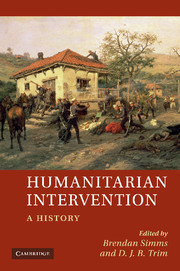Book contents
- Frontmatter
- Contents
- List of maps
- Notes on contributors
- Acknowledgements
- List of abbreviations
- 1 Towards a history of humanitarian intervention
- Part I Early modern precedents
- Part II The Great Powers and the Ottoman Empire
- Part III Intervening in Africa
- 10 The price of legitimacy in humanitarian intervention: Britain, the right of search, and the abolition of the West African slave trade, 1807–1867
- 11 British anti-slave trade and anti-slavery policy in East Africa, Arabia, and Turkey in the late nineteenth century
- 12 The origins of humanitarian intervention in Sudan: Anglo-American missionaries after 1899
- Part IV Non-European states
- Part V Postscript
- Index
10 - The price of legitimacy in humanitarian intervention: Britain, the right of search, and the abolition of the West African slave trade, 1807–1867
Published online by Cambridge University Press: 18 April 2011
- Frontmatter
- Contents
- List of maps
- Notes on contributors
- Acknowledgements
- List of abbreviations
- 1 Towards a history of humanitarian intervention
- Part I Early modern precedents
- Part II The Great Powers and the Ottoman Empire
- Part III Intervening in Africa
- 10 The price of legitimacy in humanitarian intervention: Britain, the right of search, and the abolition of the West African slave trade, 1807–1867
- 11 British anti-slave trade and anti-slavery policy in East Africa, Arabia, and Turkey in the late nineteenth century
- 12 The origins of humanitarian intervention in Sudan: Anglo-American missionaries after 1899
- Part IV Non-European states
- Part V Postscript
- Index
Summary
It rarely if ever happens that a foreign gov[ernmen]t gives up its selfish interests, its passions or its prejudices to the force of argument or persuasion; and the more such a gov[ernmen]t is in the wrong, the more pig headed it generally is, because its being very much in the wrong is a proof that it is deaf and blind to reason and right. Persuasion seldom succeeds unless there is compulsion of some sort, nearer or further off behind it.
Lord Palmerston, September 1850By the turn of the nineteenth century, the idea that the slave trade constituted a humanitarian outrage was not really in doubt. Few if any educated minds believed the fate of the African trafficked as a slave to be an attractive or even benign one; certainly no strong argument was being made that it was so. Aside from the obvious upheaval of forcible transportation from freedom on one continent to slavery on another, the cruelty and inhumanity of the slave dealers engaged in the Atlantic slave trade was infamous. Newspaper reports in Britain and on the Continent portrayed the so-called ‘Middle Passage’ as an unqualified horror. Even aside from specific instances of violence such as rape and punishment beating, the day-to-day logistics of the trade were harrowing enough: hundreds of people shackled together and crammed into impossibly confined spaces without adequate nutrition, drinking water, ventilation, drainage or even space to stand upright. Many, many thousands died on these voyages, often children.
- Type
- Chapter
- Information
- Humanitarian InterventionA History, pp. 231 - 256Publisher: Cambridge University PressPrint publication year: 2011
- 4
- Cited by



